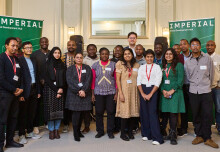
Alireza Tahmasebzadeh's graduate entrepreneur visa helped him to co-found Blocks, a fast growing smartwatch developer.

The UK should expand and streamline graduate entrepreneur visas, writes Imperial's President in the Wall Street Journal.
In an op-ed for the newspaper, 'Keeping Britain's Doors Open to Talent', Professor Alice Gast wrote: “The U.K. is a scientific superpower, and this is a benefit for jobs and growth. Brexit success must mean protecting this superpower status, by carefully designing border controls to attract ‘the brightest and best,’ as Home Secretary Amber Rudd put it at this week’s Conservative Party conference. For Britain to be a truly global leader, it must be the preferred destination for the scientists, technologists and entrepreneurs who drive economic vitality.
Britain must not let Brexit be misinterpreted as a closing of the country’s doors.
– Professor Alice Gast
President
“As a recent arrival to the U.K. from the U.S., I am often asked how Britain can be as entrepreneurial as America, with its larger pools of venture capital, incubators and start-ups. To which I reply that if the U.K. wants entrepreneurs and start-ups to thrive, it needs to welcome more entrepreneurial immigrants and give them the freedom to innovate.”
President Gast compared her US experience with the UK’s efforts to attract talented students: “In the U.S., students graduating from university can apply to stay an additional year to work, study, join or start a new company," while science, technology, engineering and medicine graduates can stay for an additional two years. "By contrast, the U.K. gains in the short term from the high fees that foreign students pay, but loses out in the long run by sending them home right after they graduate."
Visa solutions
 President Gast explained that: “The U.K. does offer a graduate entrepreneur visa for students involved with new enterprises, typically as founders. But, to receive these visas, which last up to two years, they must first demonstrate that their ventures are beneficial to the British economy. Under better circumstances, this program could be an effective lure for entrepreneurial students, but approval is difficult to obtain and the application process is overly bureaucratic. Imperial has sponsored around 20 such entrepreneurs since 2012, when this visa was introduced. We are now collaborating with the Home Office on a pilot scheme that would allow students who win places on our one-year Master’s programs to access a streamlined visa process and stay on in the U.K. for six months after they complete their degree.”
President Gast explained that: “The U.K. does offer a graduate entrepreneur visa for students involved with new enterprises, typically as founders. But, to receive these visas, which last up to two years, they must first demonstrate that their ventures are beneficial to the British economy. Under better circumstances, this program could be an effective lure for entrepreneurial students, but approval is difficult to obtain and the application process is overly bureaucratic. Imperial has sponsored around 20 such entrepreneurs since 2012, when this visa was introduced. We are now collaborating with the Home Office on a pilot scheme that would allow students who win places on our one-year Master’s programs to access a streamlined visa process and stay on in the U.K. for six months after they complete their degree.”
The article spotlights recent Imperial graduates like Charith Amarasinghe, who started Mesh Power with his fellow students to provide solar microgrid electricity in rural Africa, and Alireza Tahmasebzadeh, who co-founded smartwatch company Blocks.
Professor Gast argues that “Britain must not let Brexit be misinterpreted as a closing of the country’s doors. We must overcome this impression among bright entrepreneurial people, seize the opportunities and make the U.K. a destination for foreign talent.”
The full opinion piece can be read in the Wall Street Journal.
Article text (excluding photos or graphics) available under an Attribution-NonCommercial-ShareAlike Creative Commons license.
Photos and graphics subject to third party copyright used with permission or © Imperial College London.
Reporter

Andrew Scheuber
Communications Division

Contact details
Email: press.office@imperial.ac.uk
Show all stories by this author




Leave a comment
Your comment may be published, displaying your name as you provide it, unless you request otherwise. Your contact details will never be published.